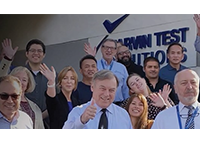Welcome to our final, but exciting, newsletter for 2022. The holidays are upon us, and I sincerely hope that you and your friends and families are able to take the time together to enjoy them.
In this month’s issue of Test Connections we’re focusing on solutions that make test easy for a range of complex applications from 5G mmWave semiconductor production to flightline armament test. At the flightline, the handheld SmartCan armament test set and the SmartCanEasy test software development kit enable Agile Combat Employment (ACE), allowing users to develop and maintain test programs as new requirements emerge. Our TS-900e-5G mmWave is the industry’s first 5G / mmWave semiconductor solution capable of testing 1 GHz to 53 GHz devices for high-volume production. And our GENASYS Series mixed-signal test platform features ATE configurations to meet and exceed your most demanding functional test requirements.
Like many of your companies, MTS has begun to participate and lead in live events! We look forward to seeing you at the upcoming Combat Air Forces Weapons and Tactics conference (WEPTAC), TestConX, and the Air & Spaces Forces Warfare Symposium, all in Q1 of 2023. Please contact HannahS@MarvinTest.com if you’d like to schedule a meeting – we have a lot to discuss.
However, if you have a urgent requirement please use the same email address to arrange a virtual or onsite meeting. We look forward to demonstrating how We Make Test Easy™ to ensure our customers’ success.
Wishing you happy holidays, excellent health, and abundant prosperity until we meet again!

Stephen T. Sargeant
Major General, USAF (Ret.)
CEO
|

SmartCanEasy – Enabling ACE with Agile Test Program Development at the Point of Need | | | Agile Combat Employment (ACE) is a USAF operational concept that enhances warfighter effectiveness through the use of streamlined logistics footprint to support forward deployments of multiple types of aircraft. The MTS-3060A SmartCanTM Universal O-Level Armament Test Set and SmartCanEasy enable ACE, providing comprehensive flightline armament test capability in a compact handheld test set that is easy to deploy, use, and maintain.
|

|
GENASYS Semi Delivers mmWave Device Test at 53 GHz | | Marvin Test Solutions’ GENASYS Semi Series 5G mmWave semiconductor production test systems meet and exceed the requirements of testing mmWave semiconductor devices with laboratory performance, with the throughput required for high volume production. |
Read More
|

|
MTS Has Exciting Career Opportunities Available Now
Why not start the New Year with a new career?
Read More
|

|
Knowledge base articles covering topics such as integration of Marvin Test Solutions products, new functionality, and frequently asked questions. Articles cover PXI Instruments, ATEasy software, LabView integration, etc. and should be a first stop for anyone with questions.
Read More
|
|